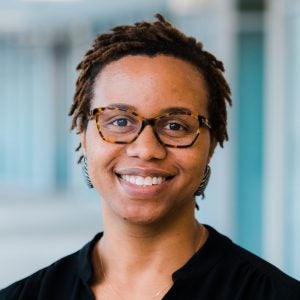
Associate Dean for Professional Advancement and Assessment, Associate Professor
Contact Information
Email: dmking7@ua.edu
Office: 1005 Little Hall
Phone: 205-348-2958
Research Areas and Expertise
- Adolescents and Young Adult Health Risk Behaviors
- Behavioral Health
- Health Equity/Health Disparities
- Social Determinants of Health
- Mental Health
- Program Evaluation
- Social Work Education
Education
- BA, Spelman College, Sociology
- MSW, University of Georgia, Social Work
- PhD, University of Georgia, Social Work
Bio
Dr. Dione Moultrie King is an Associate Professor in the University of Alabama School of Social Work and Associate Director of the UAB Social Science and Justice Research, Health Equity and Justice Core. Dr. King received her PhD and MSW from the University of Georgia and holds a B.A. in Sociology from Spelman College. Prior to Dr. King’s transition into the social work profession, she was employed as a middle school educator. Dr. King credits her experience in the K-12 system as the catalyst for her transition to social work. As a social worker, Dr. King provided clinical services to families impacted by domestic violence, homelessness, trauma, and child abuse or neglect, frequently working with youth as her primary clients. The totality of these experiences within the non-profit, child welfare, juvenile justice, and academic system have continued to inform and shape her research trajectory and interests.
Dr. King’s research agenda is largely informed by her social work practice experience working with under-resourced, vulnerable, marginalized, and underrepresented populations. As a community-engaged researcher, her scholarship explores health behaviors and health disparities including sexual and reproductive health, dating violence, mental health, and socio-structural determinants that impact the health and well-being of Black adolescents and young adults. Her secondary line of inquiry focuses on the scholarship of teaching and learning (SOTL). Through this research arm, she incorporates and evaluates novel education modalities such as team-based learning, technology usage, and student-centered instructional methods while also assessing the educational landscape giving attention to microaggressions and other barriers that impeded the learning environment. As a research-intensive scholar, Dr. King has an active publication and grantsmanship record with external- and internally funded research and evaluation-based projects. Her research has been featured in several academic journals including the Journal of Racial and Ethnic Disparities, Social Work in Public Health, Vulnerable Children and Youth Studies, Child & Youth Services Review, and the Journal of Family Social Work.
For Dr. King, service is an extension of her teaching and research efforts. As a lifelong community servant, Dr. King exemplifies Shirley Chisholm’s quote, “Service is the rent we pay, for the privilege of living on this earth.” Nationally, Dr. King lends her expertise through the Quality Matters program as a certified Master Reviewer. In this role, she leads course reviews and disseminates research-informed instructional practices to promote student engagement and academic success for student learners. Additionally, Dr. King supports the Council on Social Work Education serving as an Accreditation Site Visitor, past chair of the Council on Racial, Ethnic, and Cultural Diversity, a council that promotes the expansion of diversity knowledge within social work education and research, and the Minority Fellowship Program advisory boards. Locally, she extends her expertise and leadership through engagement with community-based projects and organizations that work to improve the quality of life and lived experience for Alabamians, particularly those experiencing persistent and systemic disparities.
Dr. King lives by the motto, “Injustice anywhere is a threat to justice everywhere. We are caught in an inescapable network of mutuality, tied in a single garment of destiny. Whatever affects one directly, affects all indirectly.” This quote taken directly from Dr. Martin Luther King Jr.’s 1963 Letter from a Birmingham jail resonates with her as a social worker and reflects the impact she seeks to make in the lives of individuals, families, communities, and systems.
Select Publications
Articles
King, D. M., Rouland, R. S., Howell, T. H., Dyson, Y. D., Simmons, L. D., Bencomo, B. & Becker, B. (in press). Microaggressions, students of color, and social work education: A systematic review of literature. Journal of Social Work Education
Dorsey, M., King, D. M., Howell, T. H., & Dyson, Y.D. (2022). Culturally responsive sexual health intervention for Black adolescent females: A systematic review of the literature. Children and Youth Services Review, 137(1), https://doi.org/10.1016/j.childyouth.2022.106480
King, D. M., Orihuela, C. A., *Martino, M. & Mrug, S. (2021). Does adolescent free time matter? Exploring the association between adolescent leisure activities and dating violence perpetration. Urban Social Work, 5(1), 28-42. https://doi.org/10.1891/USW-D-20-00006
King, D. M., Orihuela, C. A., Mrug, S. & Hatcher, S. S. (2021). Sexual risk behaviors, perceived future life chances, and leisure activities among Black youth in one urban city. Urban Social Work, 5(1), 15-27. https://doi.org/ 10.1891/USW-D-20-00007
Hitchcock, L.I, King, D. M., Johnson, K., Cohen, H. & McPherson, T. (2019). Learning Outcomes for Adolescent SBIRT Simulation Training in Social Work and Nursing Education. Journal of Social Work Practice in Addictions, 19(1-2), 47-56. https://doi.org/10.1080/1533256x.2019.1591781
King, D. M., Donley, T., Mbizo, J., *Higgins, M., *Langaigne, A., Middleton, E. J. & Stokes-Williams, C. (2019). The use of a community-based preconception peer health educator training intervention to improve preconception health knowledge. Journal of Racial and Ethnic Health Disparities, 6(4), 686-700. https://doi.org/10.1007/s40615-019-00567-y
Lewis, M. L. & King, D. M. (2019). Teaching self-care: The utilization of self-care in social work practicum to prevent compassion fatigue, burnout and vicarious trauma. Journal of Human Behavior in the Social Environment, Special Issue: Self-Care Practices & Vicarious Trauma, 29(1), 96-106. https://doi.org/10.1080/10911359.2018.1482482
Donley, T., King, D. M., Nhlanganiso, N., Okafor, A. & Mbizo, J. (2018). Socioeconomic status, family functioning and delayed care among children with special needs. Social Work in Public Health, 33(6), 361-381. https://doi.org/10.1080/19371918.2018.1504703
